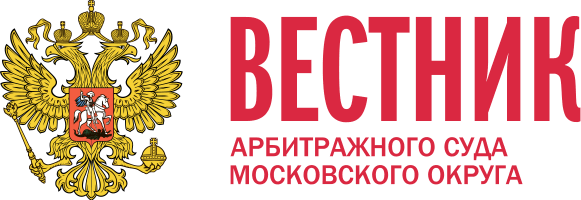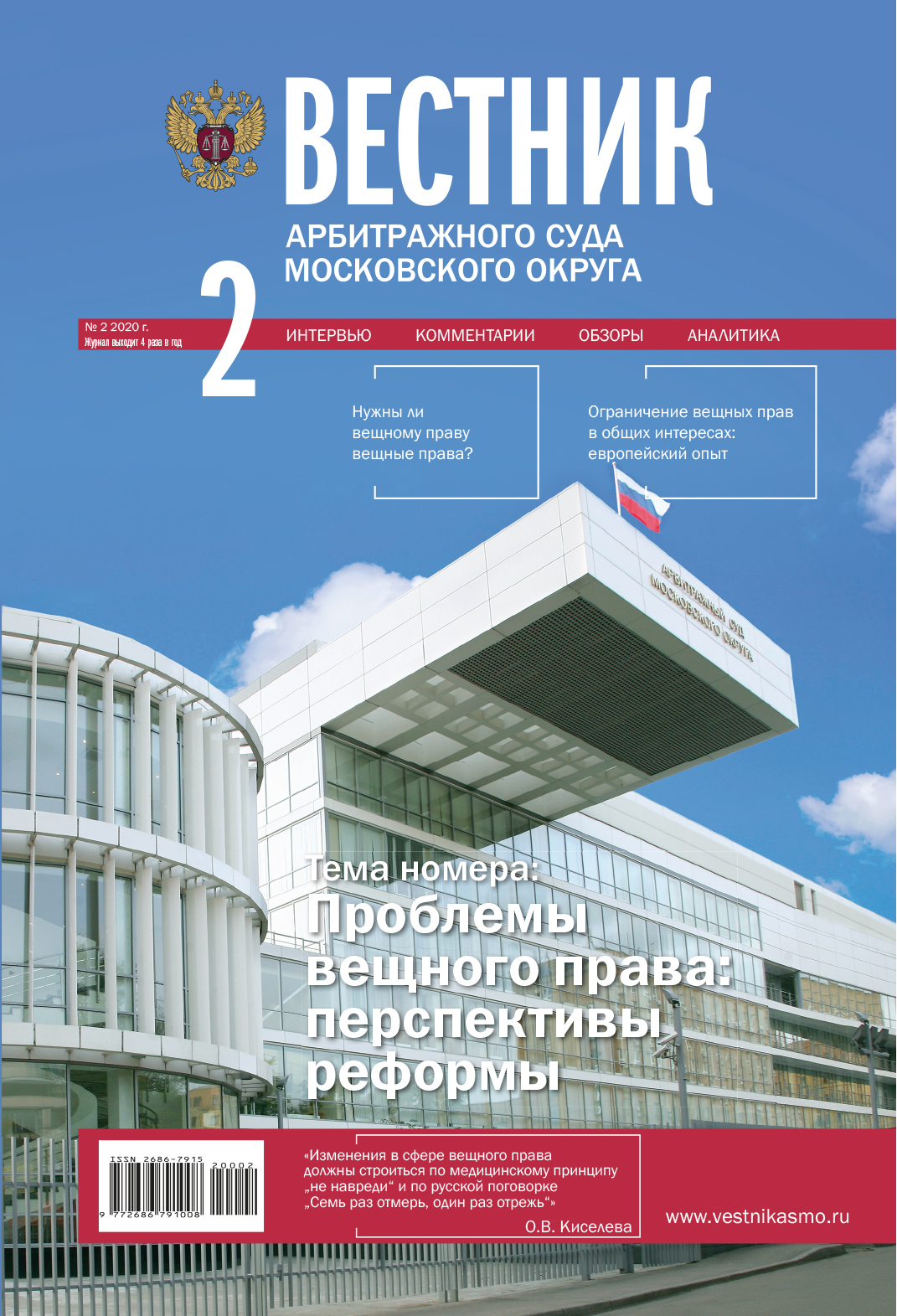Courts News
News of Moscow District Courts
Interview of the issue
O.V. Kiseleva. “Changes in Property Law Should Be Based on the Medical Principle ‘Do No Harm’ and the Russian Saying ‘Measure Seven Times, Cut Once’”
Topicality
How the Specificity of a Thing Affects the Proprietary Protection
Analytics: Problems of Property Rights: Prospects of the Reform
V.A. Alexeev
Does Property Law Need Property Rights?
The article contains a critical analysis of draft No. 47538-6 / 5 of the Federal Law “On Amendments to Part One of the Civil Code of the Russian Federation”, submitted for discussion by the Presidential Council on the Codification and Improvement of Civil Law. The author comes to the conclusion that the concept of the draft does not meet the modern needs of the legal regulation of civil circulation and is an unprepared legal and social experiment. As an alternative to the closed list of limited property rights, it is proposed to deny the concept of subjective property right from the law and use the concept of the current Civil Code of the Russian Federation, which establishes for a number of rights, regardless of their classification as property rights, a special legal regime, the basis of which is the property of following of these rights.
Keywords: property law, property of following, limited property rights, numerus clausus, legal strength of law, property law reform
V.O. Puchkov
Domain name from the point of view of civil law doctrine and dogmatics
The article deals with the problem of the domain name legal regime. The author criticizes the basic concepts of domain name as a service, a thing and as a result of intellectual activities. Article argues thesis stating that domain name may be determined as a thing. Basing on the analysis of series of such different approaches author proves the problem of domain name legal regime to be made up. Author justifies the idea of the absence of domain name in the list of civil law object.
Keywords: civil law, informational technologies, domain name, legal regime, exclusive right
Yu.G. Bogatina
Limitation of Property Rights in Public Interests: The European Experience
This article will address the criteria used in assessing the legality of state actions limiting private property rights and the consequences of such actions. What is of public interest? In what cases the interference of authorities is admissible? What compensation should be paid to the owner for the restriction of his right? Is the lack of compensation from the state always a violation of international standards of protection of property rights? These questions are proposed for discussion.
Keywords: limitation of propety rights, public interest, balance between private and public, fair compensation
Yu.G. Gvozdev
Resolution of Disputes Related to the Protection of Property Rights in Bankruptcy Cases
The author analyzes problematic issues related to the protection of property rights and the provision of proprietary protection during consideration of isolated disputes about the exclusion of property from the bankruptcy mass in bankruptcy cases. The author also provides a brief overview of court practice on the topic raised.
Keywords: competitive mass, exclusion from the competitive mass, property claim for recognition of property right in bankruptcy cases, owner protection, property claim.
Analytics: Open Tribune
S.S. Galkin
Subordination of creditor claims in bankruptcy proceedings: a possible practical model de lege lata
The article analyzes the practical aspects of the subordination of the creditor claims that occurred after the initiation of bankruptcy proceedings. The author formulates possible models of the subordination of the creditor claims which based on national legislation and it’s application practice.
Subordination of creditor claims, affiliates, current payment creditors
A.Ya. Berlin
Ways to Protect a Creditor under a Settlement Agreement
The article is devoted to the research of remedies available to the parties to the settlement agreement in case of its non-fulfillment. The institution of changing the order and way of execution of the judicial act with restriction of the claim form of protection is widely spread. The developed approach does not correspond to the purpose of the claim procedure as a universal form of settlement of a dispute on civil law. However, it is caused by gaps of procedural regulation, necessity of which elimination is grounded by the modern doctrine of civil process.
Keywords: settlement agreement, compensation for damages, change of order and method of execution of the judicial act
P.M. Morhat
Legal Problems of Challenging the Competitive Deals of the Debtor in the Absence of Necessary Documentation on Transactions
The paper investigates the problems of contesting a debtor’s bankruptcy trustee on special and civil grounds in the absence of documentation on the disputed transactions. The proposals on the algorithm of actions of the bankruptcy trustee when making a decision on the issue of contesting or refusing to contest the transactions of the debtor are formulated. It is concluded that the bankruptcy trustee should file a lawsuit to contest the debtor’s transactions only for transactions whose probability of contestation is high enough that they cannot be determined without minimal documentation on the transactions planned to be challenged. The fact that the bankruptcy trustee filed a lawsuit challenging the debtor’s transaction without the availability of initial information and (or) documentation to determine the likelihood of the results of such a dispute may be the basis for recovering the corresponding losses from the bankruptcy manager caused by the said dispute.
Keywords: insolvency (bankruptcy), contesting transactions of the debtor, lack of documentation, good faith and reasonableness in bankruptcy, litigation issues, powers of the bankruptcy trustee
V.P. Sorokin
Developing Alternative Forms of Economic Disputes Resolution as an Actual Direction in Reducing the Judicial Burden on Arbitrazh (Commercial) Courts
The article is devoted to the actual problem of development of alternative forms of economic dispute resolution. It shows the reasons (high workload of the courts), goals (reduction of the load on the courts, optimization of court proceedings) and ways of solving this problem. The high load on courts at all levels requires new procedural tools, especially in the resolution of disputes of a high complexity category. The author considers alternative forms of economic dispute resolution, such as mediation, arbitration and judicial conciliation.
Keywords: court caseload, simplified proceedings, alternative forms of dispute resolution, mediation, judicial conciliation
A.A. Soloviev
Subsidiary Bodies of the Federal Judicial Council of the United Mexican States
The author continues to study international experience in the legal regulation of the judiciary through the example of the Federal Council of the Judiciary of the United Mexican States. The article deals with the subsidiary bodies of the Council, which play a very significant role in the functioning of the judiciary. In particular, it analyses the foundations of the legal status of bodies such as the Judicial Institute, the Judicial Inspectorate, the Office of Audit and Oversight of the Federal Judiciary, the Federal Institute of Public Defence and the Federal Institute of Competitive Proceedings.
Keywords: foreign experience, bodies of judicial community, United Mexican States, Federal Council of Judicial Power, subsidiary bodies
L.I. Zaytseva
Modification of Procedural Law in Times of the Pandemic
The article identifies advantages and problematic aspects of such element of eJustice as online courtroom format. The author proposed a number of organizational, technical and procedural measures aimed at the effective use of this element. Taking into account the experience of functioning of foreign judicial bodies during the pandemic, the author concludes that it is necessary to develop special approaches and preventive measures aimed at the long-term perspective, as well as to develop dispute management.
Keywords: information technology, online services, remote court sessions, flexibility of procedure, minimization of costs, procedural mechanisms
Court Practice Reviews
Minutes No. 168 of the Meeting of the Working Group to Discuss the Practice of the Russian Federation Arbitrazh (Commercial) Procedure Code Application


